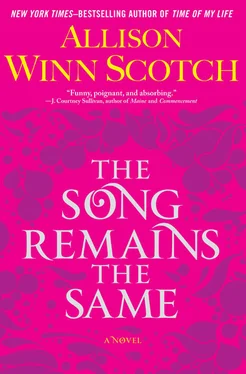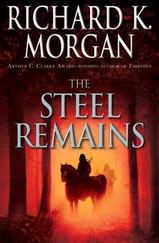Today on the street, I spot Tina Marquis under her pink umbrella. The rain is picking up now, and I shuffle as quickly as the sidewalk congestion and the ache in my torso allow. The change in weather makes my bones hurt in a way that they didn’t before the accident, as if they’re all imploring me to stay in bed, dive deep and safely under the covers.
“Sweetie!” Tina says, pulling me close by the elbow. “You’re practically a drowned rat. The first rule of this weather: always come prepared.”
It’s impossible not to smile at her genuine, openhearted kindness, despite my mood, despite everything. I pop out my headphones. I can see why we were friends way back when.
“That’s what happens when you lose your mind. You forget the basics,” I say, matting back my damp hair, brushing the wayward pellets off the shoulders of my trench coat.
“So I told him that we’d be in and out,” she says. I nod. This seems like a Hail Mary anyway.
“Thanks for doing this,” I say. “I’m trying to put things back together, but it’s starting to feel like they’re impossible to connect.”
“Listen, Nell.” She’s suddenly morose, that chameleon rearing her head. “We were best friends. And then we weren’t. But we were for a long time, and if I can help you—even with some easy favor like calling up the client to show you the space you were interested in—I’ll do it. That’s no skin off my back.”
“Well, I know you have places to be.”
Tina unlatches the outside door and enters a security code into the panel on the side of the foyer.
“And I know that you’re terrible at asking for help. So I’m hardly going to shirk it when you finally do.”
“Always? Was I always terrible?”
She pokes the Up button for the elevator. “Hmmm, not always. I don’t need to tell you that you became, well, more independent when your dad left. But then, who could blame you?” She shrugs, holds the open door, and I step inside. “I didn’t.”
“I just cut you off? Like, black and white?” I remember my mom’s words from way back in the hospital: We all have our faults. Yours is that life is in black and white.
“It wasn’t just me, so I didn’t take it personally.” She smiles, and we both watch the overhead numbers as they tick upward. “Being a teenager is brutal. We were all dealing with our own crap.”
“What was your crap?”
“Mine? Oh, the usual: eating disorder.” She looks at me, her shoulders rising, then falling. “Bulimia through sophomore year in college.”
“Wouldn’t it be nice not to have our own crap?” I say, recognizing fully that losing your memory of that old crap is precisely the opportunity to do just that.
“The crap makes us what we are,” she says, then shakes her head and laughs. “Or maybe that’s just a pile of bullshit left over from too many self-help books.”
“Maybe.” I grin back. “Maybe that’s exactly what it is.”
The door dings open on the fifth floor.
“Just down here to the left,” she says, pointing the way. I survey the hallway. It’s nondescript in the way that a lot of New York apartment buildings are. Beige carpet, dull overhead lighting, muted wallpaper with an innocuous faded stripe. A sad-looking pumpkin cutout bought at a local drugstore adorns one of the doors as we pass it by, a pathetic attempt to brighten the hallway for Halloween, still weeks away. Tina stops in front of apartment number 513, pulls an enormous set of keys from her purse, and tinkers with the lock until she finds the right one. The latch unbolts with a confident click.
“You loved this place as soon as you saw it,” she says, our heels echoing on the hardwood through the foyer. “You said it was almost animalistic, how much it spoke to you. I remember that quote because it seemed so poetic.”
I step forward into the space. It is expansive, radiating light despite the dreary, depleted day, with soaring ceilings and that original brick wall and fireplace that Tina had told me about back in the pizza parlor. The beamed ceilings resonate somewhere inside of me, and I stare upward, wondering why they look so familiar, why this whole scene puts me both instantly at ease and entirely on edge. I move toward the wall of windows, with their view of the East River. The glass is streaked with threads of rain, and below, the river looks treacherous, roiling from the storm overhead.
I close my eyes and imagine. I can still hear the Smiths in my mind, providing me a sound track, a map to what I am dreaming.
“It’s not my home, it’s their home. And I’m not welcome no more.”
I must have first seen this place when? Five or six months ago? April. It would have been April, right on the cusp of spring. I open my eyes again and envision the river calm, welcoming, and then it comes to me.
Of course.
I remember it clearly, that summer. This wasn’t in the main house, it was…where? In my father’s studio. I know this on instinct. In my memory, the rug beneath my feet, it’s the same one that’s now in my living room. I am barefoot, and the fabric isn’t as worn as it is today, but still it’s soothing, tickling the rough skin of my arches. The Smiths, just like today, are thundering in the background, but I’m unsure if this is a crossover from my synapses or if this, too, is real. There is a picture window in front of me, swallowing up nearly the entire front façade of the workspace, and out just beyond it is a body of water. A lake? A river? It is a wildly beautiful, glorious day, and my thirteen-year-old self is itching to dive into it, so I have gone in search of my dad to come out and play. My dad…I search my brain as I stare out at the rain-soaked skyline and try to home in on my father. There he is . He is in the corner, leaning against the brick wall of his studio, pressed together like a ball, a fetus. He is sobbing, moaning, emitting sounds of an injured seal. There are pools of paint splattered every which way on the wall, a smashed easel at his feet. A lonely, empty dartboard has fallen on the floor just beyond the fringe of the rug. My childhood self watches him from just inside the door frame, and gingerly I take a step back, then another, creeping so I don’t betray what I’ve seen. I take one step more, and my ankle gives way, rolling under itself until I, too, am crashing to the floor. A baseball bat— the picture in my album —spirals next to me, and I hear my dad jolt from the other room. Suddenly, he is over me, his shadow casting a pallor from the bright rays brought in by the outside sun. He is pale underneath his goatee; the circles under his eyes are etched in black.
“Get out of here, Nell,” he says, his voice weary, with no malice behind it.
“Don’t be sad, Daddy.” I push myself to a stand.
“Some things can’t be helped,” he says, already turning and moving to fold himself back into the corner.
An explosion of thunder roils over the East River, and as quickly as it came, the memory is gone.
On the way out, after Tina has bolted the door and stuffed her cartoon-size key chain back in her bag, I remember my own set of keys. I dig into the front pocket of my purse.
“You seem to be an expert in locksmanship,” I say, placing them in her hand. “These. In your opinion, what are they from?”
She flips each one over in her palm, inspecting them like a biologist, running the tip of her index finger over the grooves.
“They’re house keys,” she says. “Nothing like this is from a New York apartment, and they’re too big for a safe-deposit box or locker or storage facility.”
“But I don’t have a house,” I say flatly.
“Well,” she says, just as the elevator plunges us downward, “someone does.”
Читать дальше












